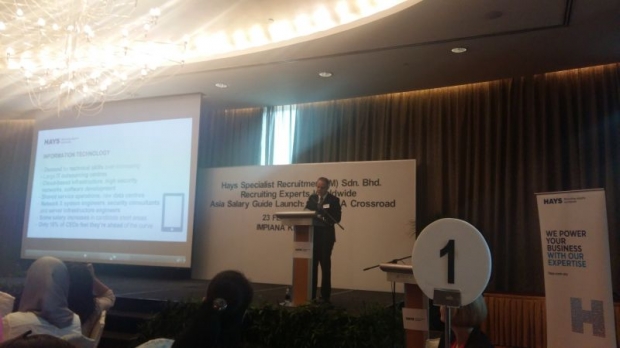
Firms demand for skilled workers in Malaysia
KUALA LUMPUR, Feb 23 ― According to global job recruiters Hays, Malaysian firms are facing a major shortage of skilled workers, with more than 30 per cent of employers saying the talent deficiency could hamper operations and cause them to miss business targets.
In its 2016 salary guide report, Hays said nearly 100 per cent of companies here complained of the lack of talent, and warned that the problem could be further compounded by retention issues as more than 40 per cent of workers surveyed said they are actively looking for new jobs, mostly for better pay.
“There is a fundamental skilled workers shortages in Malaysia so companies have to be savvy in their retention policy,” Hays' regional and Malaysian director Tom Osborne said at the report's unveiling here.
The shortage has prompted companies' willingness to hire expatriate foreign skilled workers with more than 65 per cent of employers saying they were willing to offer attractive salaries to increase appeal.
But Putrajaya's labour protectionist policy, which extends to key sectors like banking and engineering, have dented their recruitment targets.
“There is high demand for skilled workers in the financial sector but Malaysia has a quota for foreign employment,” Osborne said.
On the candidate side, Hays said 44 per cent of those surveyed said they are “restless” and are actively hunting for new jobs. As many as 42 per cent were open to new opportunities.
A quarter of those surveyed said they anticipate moving on to different companies within the next six months while about 20 per cent believe they would likely leave their present positions by year-end.
Despite the dilemma, companies are still cautious about increasing salaries, Hays' Asian managing director Christine Wright said.
“For employers, the message is to focus attention on staff retention strategies as our candidate survey reveals a high level of candidates are either actively looking for a new role or are open to hearing about a new opportunity,” she said in the report.
Reasons for job hunting include better salary and benefits (48 per cent), new challenges (40 per cent), lack of career progression (36 per cent) and management style or company culture (25 per cent).
Dr Andrew Staples, South East Asian director of The Economist's Corporate Network, said skilled labour shortages have become major problems for Asean as the region grows more economically competitive.
He noted that a survey done by The Economist showed that up to 36 per cent of employers in Asia Pacific indicated unhappiness with their new hires.
“We can see that skilled labour shortages is a serious problem in the region… I think it's extremely crucial to develop human capital,” he said.
South East Asia is currently the third biggest economy in terms of real growth after the US and China.
Please confirm If you want to unregister
You have been unregistered from gradlink







